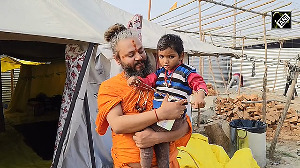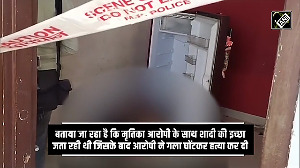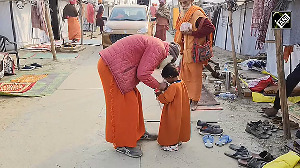Commerce minister Kamal Nath told World Trade Organization chief Pascal Lamy on Monday that India had no intention of showing any flexibility in the ministerial meeting beginning December 12.
The meeting has been convened to conclude modalities in the Doha Development Agenda for Agriculture and Market Access for Industrial Goods.
Lamy had called on Nath to inform him about the meeting and press the commerce minister to attend the meeting at any cost.
Despite sharp differences among key members over the modalities in the Agenda, Lamy feels it would be a disaster if a ministerial meeting is not held at this juncture.
The modalities suggest the level of tariff and subsidy reduction commitments in the Doha agriculture package and tariff reduction commitments for the industrial products.
Several key members cautioned the director general on Sunday about lack of progress on outstanding issues in both agriculture and non-agriculture market access, arguing that unless their specific concerns were properly addressed they would find it difficult to join the modalities, trade envoys said.
But Lamy along with Brazilian Foreign Minister Celso Amorim and European Union Trade Commissioner Catherine Ashton reckon that an agreement on the modalities is vital to strengthen the global trading system.
Responding to these assessments, Nath said he conveyed to Lamy that he was 'busy with very serious security concerns'.
Besides, 'nothing has moved since the failed July ministerial meeting to warrant another ministerial event'.
"There is no point in having a ministerial meeting in abstract," he said, arguing that he had been projected as a villain since he stood for the concerns of the developing countries in the Doha agriculture negotiations.
"But I don't mind being seen as a hurdle if I have to protect the interests of my farmers or farmers in poor, developing countries," Nath maintained.
"These are the times of economic distress and if a deal helps in obviating the distress, we would have an agreement," Nath said, arguing that "I am not coming to increase our pain".
"We can't play any part in salvaging the economies of the developed world," he said, maintaining that almost all difficult issues in the Agenda 'remain unresolved at this juncture'.
Trade envoys from the industrialised countries are eagerly waiting to see what happens in the Madhya Pradesh Assembly elections on December 8, hoping against hope that Nath would be made the chief minister of the state if Congress was voted to power.
Further, some trade envoys reckon that if there is a Cabinet reshuffle, then Nath might be shifted to some other ministry, paving the way for appointing Montek Singh Ahluwalia, the Deputy Chairman of the Planning Commission, as the new commerce minister.
With Ahluwalia as India's chief trade negotiator, New Delhi might concede tough demands being made by the US and other industrialised countries in the special safeguards mechanism to curb unforeseen surges in the import of farm products and the sectoral tariff elimination for industrial products, trade envoys said.







 © 2025
© 2025